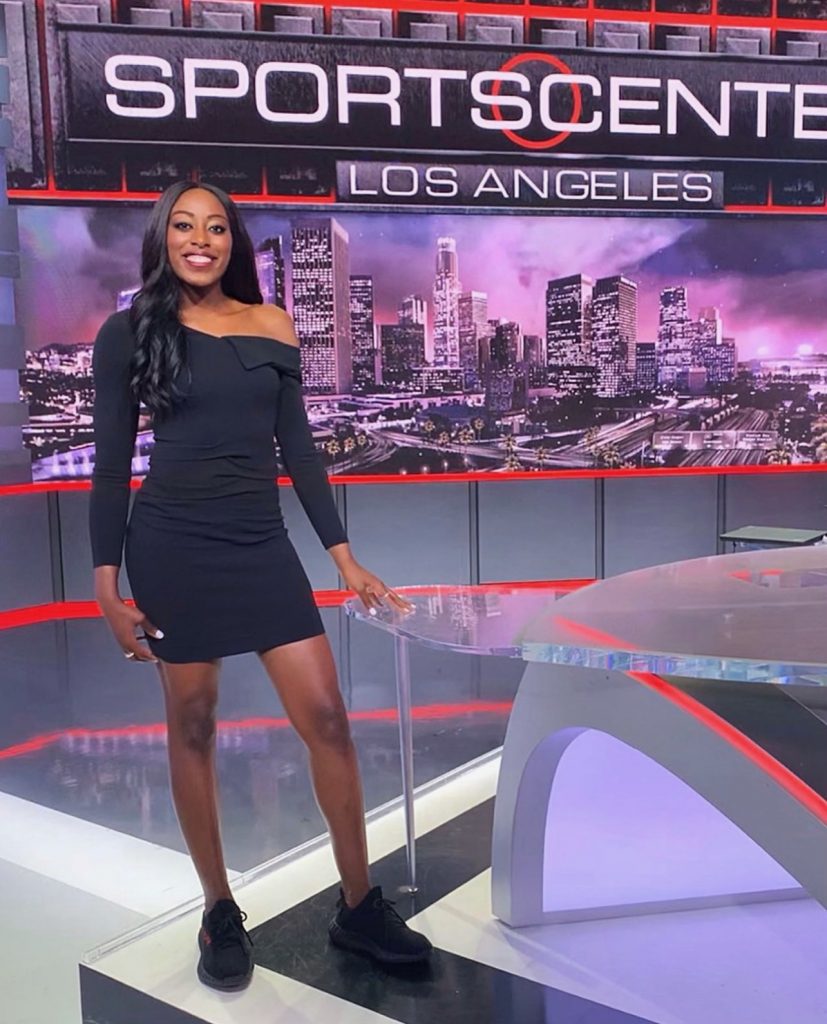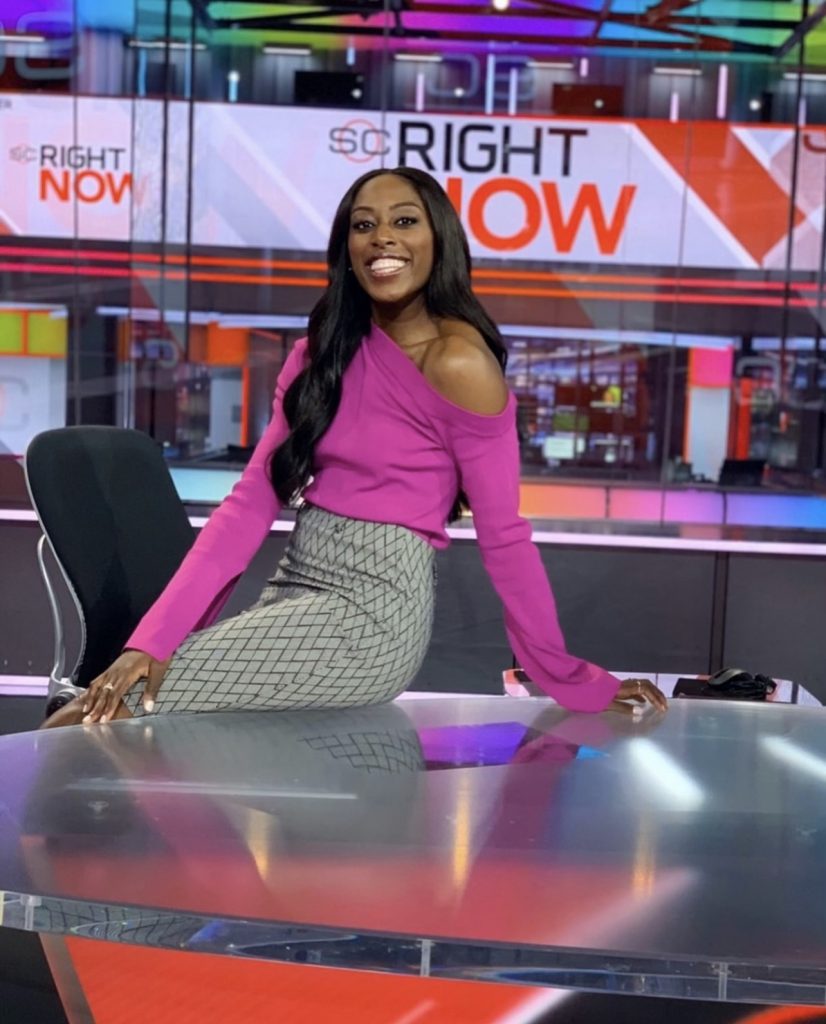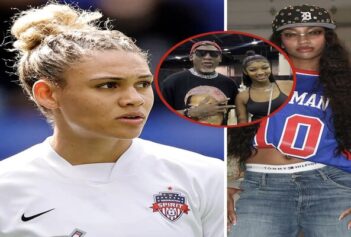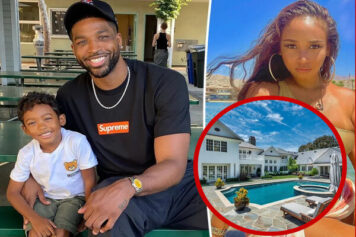Sparks’ star Chiney Ogwumike to serve as Executive Producer
By Chiney Ogwumike, as told to Melanie Page
Chiney Ogwumike’s resume just added another title: Executive Producer. The Nigerian-American Los Angeles Sparks veteran joined forces with ESPN Films to document what can only be described as an unprecedented 2020 WNBA season, whose narrative was marred by the shutdown of sports due to COVID-19 and the league’s focus on making social justice its top priority. Ogwumike penned an article — as told to fellow filmmaker Melanie Page for The Shadow League — and shares that the endeavor is a merging of her purpose and her passion. “144” airs May 13 on ESPN.
“If you have a purpose and a passion, you are unstoppable.”
That was one of my favorite quotes growing up, and I remember a basketball trainer sharing those thoughts at a camp as a 10-year-old. Purpose and passion have been at the forefront of my mind throughout the making of this film. My passion is basketball; it’s transformed my life — and it’s allowed me to have a voice. My purpose is being realized in “144.”
It’s just our time — time for Black women to achieve despite the odds; that has always resonated with me. When I had an opportunity to partner with ESPN Films, it was a natural merging of my passion for entertainment and storytelling and being able to be a creator.
“144” is unprecedented for a lot of reasons. For starters, this is the first real partnership between ESPN Films and the WNBA overall; for me, that’s a huge accomplishment I’m very proud of.
Typically for films of this magnitude to happen, ESPN will hire an outside production company to bring a vision to life. This was my first time. ESPN understood that this opportunity was different — that, in this time of racial reckoning, we had to take care of the women. This opportunity — 144 WNBA players in a “Bubble” for 62 days at IMG Academy in Bradenton, Florida — created a larger opportunity. It’s a story of the women who achieve, to speak out, speak up and affect change.
READ MORE: WNBA Players & Family Are Frontline Soldiers In Fight Against Coronavirus, Social Injustice
We needed filmmakers who understood that, which means working with Lauren Stowell, who is a multi-Emmy award winning producer. It’s Jenna Contreras, whose filmography includes a film about the final pre-season for legendary Notre Dame basketball coach, Muffet McGraw.
My agent, Allison Galer, has been with me, every step of the way for this film. This was the core four, all women, millennial women, women of our generation who understand the purpose of this story. And then our number one lead producer at ESPN Films, Erin Layden, oversaw the entire process.
My role was literally to get players comfortable with cameras and being open to being transparent and showing our lives as it happened during this time. There was an inherent trust between our cameras and the players.
We all knew we represented the same league and that this season was bigger than all of us. What makes this film unique is that you’re getting athletes, not media availability.
What we ended up seeing was top players speaking their truth, speaking their emotions. There was a “freeness” to the exchange because trust was not an issue; they knew we’d take care of them, that it’s a film for women by women.
“Society has dictated our narrative, and we know society is male-dominated. This is a reflection of who we are and who we want to be authentically.”
I had this fire in my soul to really carry my weight. I knew what that could look like as a broadcaster in real time, advocating for the women and basically educating everyone with my microphone on ESPN.

It was a point where I knew I could translate what these athletes were saying and hope that people can open their hearts and minds to why these athletes chose to do this and use their platforms for positive change.
When the Jacob Blake incident was unfolding, we knew that something was going to happen. This was no ordinary time. I was working on air, and I remember getting a call from my sister, Nneka, and I telling her: “Hey, Nneka, I’m on air and the Milwaukee Bucks are postponing their game. I know you’re trying to decide what to do. You got this.”
I’m now thrusted into a position where I’m a voice — explaining why these athletes are deciding to use this moment to bring attention to another pandemic that’s affecting Black people.
I remember after my show, and looking up at the TV and seeing my sister after the team read the collective statement on why they decided to postpone games. And it felt so surreal. After that, I called her, and I told her: “Nneka, we need our cameras there.” That doesn’t happen if it’s not a WNBA player who knows a lot of the players, whose sister is President of the WNBA Players Association who could also wear a mic. None of that happens without being uniquely positioned for that moment.
****
There’s too much at stake. I think that’s why athletes continue to speak, not because they want to necessarily, but because we have the responsibility to advocate for those who look like us. We understand that we are fortunate to have a platform to create change for our communities. The cool part is that these things don’t have to be mutually exclusive anymore.
It’s not always easy, and we know that. We’ve seen in certain isolated incidents where you advocate on your own that there are definite real dire consequences for your career. That’s why you start seeing the mobilization of athletes as a whole because you need all of us. You can’t isolate one of us, you can’t isolate all of us.
We know we have the added burden of educating people as to why this matters, every step of the way. It’s not like Michael Jordan — The Last Dance — where people automatically see him sitting in an armchair, like, “Oh my gosh, this is the thing I have to tap into.” What these 144 women did is real and meaningful that has ripple effects to the highest office of the land to people getting stimulus checks. We have to educate people as to why this matters and then deliver.
We didn’t know going into the season that we would capture all this. We didn’t know all this was going to go down, but once we were in there, we’re like, “Whoa, people need to see the human elements of what these women are going through. We have an arsenal of content that we think is gold that we hope we can continue to find ways to take to use.
We may not all agree on everything — we understand that, and that’s not the goal. But if one person is suffering, we’re all suffering. That’s the mindset we have. That’s why we’ve been able to be extremely effective, because with 144, much less than the men, we can all execute at a high level when it comes to stuff like that. We have to continue, especially as black women, the rising generation that is pushing diversity and representation, we have to continue to find ways to succeed in places that are not built for us to exist.

There are worthy stories to be told right now. All you need are the right teammates to get that to happen. We have many more stories that we could tell. We just need people to understand that these stories matter.
When I started playing basketball, I did not know I would become a broadcaster. When I became a broadcaster, I did not know I was going to be an executive producer on a documentary. Having an open mind, being creative and not accepting the norm of putting women, black women, in a box and pushing those boundaries.
Anything is possible. We’re proof of that.
****
Chiney Ogwumike is a two-time WNBA All-Star and ESPN commentator. Melanie Page is currently producing her own film about women’s basketball in the Washington, DC area called “Can’t Retire From This.”



